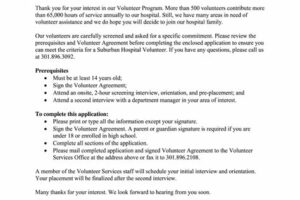Table of Contents
Looking to make a difference in the lives of elderly patients? Consider becoming a volunteer for the Hospital Elder Life Program. Join our team and provide companionship, support, and assistance to seniors during their hospital stay. Help reduce delirium, improve patient outcomes, and enhance overall well-being. Apply now!
The Hospital Elder Life Program (HELP) Volunteer is a vital role within the healthcare system, providing indispensable assistance to seniors during their hospital stay. With the aging population on the rise, the need for compassionate individuals who can support and advocate for elderly patients has become increasingly crucial. But what sets these volunteers apart is their unique ability to bring comfort and companionship while also addressing the specific needs and challenges faced by older adults. By joining forces with medical professionals, HELP Volunteers create a powerful alliance that not only enhances the quality of care provided but also promotes a sense of dignity and well-being for our beloved seniors.
A Helping Hand for Hospitalized Seniors: The Hospital Elder Life Program Volunteer
When it comes to caring for our elderly loved ones, we often find ourselves searching for ways to ensure their comfort and well-being during hospital stays. The Hospital Elder Life Program (HELP) recognizes this need and has established a unique volunteer role specifically designed to support senior patients throughout their hospitalization journey. These dedicated individuals, known as Hospital Elder Life Program Volunteers, play a vital role in enhancing the quality of life for older adults in medical settings. Let’s take a closer look at the incredible work they do.
What is the Hospital Elder Life Program?
The Hospital Elder Life Program is a comprehensive evidence-based intervention that aims to prevent delirium and functional decline among hospitalized older adults. Delirium, a sudden change in mental status, often occurs in elderly patients due to factors such as medication changes, immobility, or unfamiliar surroundings. The HELP program provides targeted interventions, including cognitive activities, early mobilization, and therapeutic interventions, to address these issues and improve patient outcomes.
The Role of a Hospital Elder Life Program Volunteer
Hospital Elder Life Program Volunteers serve as an essential component of the HELP team, working alongside healthcare professionals to provide companionship and support to older patients. These volunteers receive specialized training and are equipped with the knowledge and skills needed to engage seniors in activities that promote cognitive stimulation, mobility, and overall well-being.
Creating Connections and Alleviating Isolation
One of the primary goals of Hospital Elder Life Program Volunteers is to combat the feelings of isolation that many elderly patients experience during their hospital stay. By spending time with patients, engaging in conversations, and playing games or doing puzzles together, volunteers help foster social connections and alleviate the sense of loneliness that can often accompany hospitalization.
Encouraging Mobility and Independence
Another crucial aspect of the Hospital Elder Life Program Volunteer’s role is to encourage mobility and independence among older patients. Volunteers work closely with healthcare professionals to devise individualized exercise plans and assist with activities such as walking, stretching, and balance exercises. By promoting physical activity, volunteers help prevent functional decline and contribute to a speedier recovery for seniors.
Providing Emotional Support
Hospital stays can be emotionally challenging for elderly patients, particularly when they are separated from their families or experiencing health-related concerns. Hospital Elder Life Program Volunteers offer a compassionate presence, lending an empathetic ear and providing emotional support to those who may be feeling anxious, scared, or overwhelmed.
Assisting with Therapeutic Activities
Hospital Elder Life Program Volunteers are trained to implement a range of therapeutic activities designed to stimulate cognitive function and promote mental well-being. From reading aloud and engaging in reminiscence therapy to playing board games and solving puzzles, these activities help keep seniors mentally sharp and engaged during their hospital stay.
Collaborating with Healthcare Professionals
In order to provide the best possible care, Hospital Elder Life Program Volunteers work closely with healthcare professionals, including doctors, nurses, and therapists. They communicate patient progress and observations, ensuring that any changes or concerns are promptly addressed. This collaboration ensures a comprehensive approach to patient care and enhances the overall effectiveness of the Hospital Elder Life Program.
The Impact of Hospital Elder Life Program Volunteers
The presence of Hospital Elder Life Program Volunteers has a profound impact on the well-being and recovery of elderly patients. Their support helps prevent delirium, reduces functional decline, and enhances patient satisfaction. Numerous studies have shown that the involvement of volunteers in programs like HELP leads to shorter hospital stays, decreased rates of institutionalization, and improved overall health outcomes for older adults.
Becoming a Hospital Elder Life Program Volunteer
If you are passionate about making a difference in the lives of hospitalized seniors, becoming a Hospital Elder Life Program Volunteer may be the perfect opportunity for you. Many hospitals and healthcare organizations offer volunteer programs that align with the HELP initiative. Reach out to your local hospital or community center to inquire about training and volunteer opportunities available.
A Rewarding Experience for All
Volunteering as a Hospital Elder Life Program Volunteer not only benefits the patients but also brings immense fulfillment to the volunteers themselves. The opportunity to connect with older adults, witness their strength and resilience, and contribute to their well-being is an incredibly rewarding experience. By dedicating their time and compassion, these volunteers become integral members of the healthcare team, ensuring that our elderly loved ones receive the care and support they deserve during their hospital stay.
The Importance of Volunteerism in Elder Care
Healthcare institutions across the nation are recognizing the invaluable contribution of volunteers in enhancing the well-being of elderly patients. The Hospital Elder Life Program (HELP) has emerged as a groundbreaking initiative that pairs trained volunteers with older adults to improve their hospital experience. These selfless volunteers are the unsung heroes of elder care, providing companionship, emotional support, and personalized assistance to ensure a smooth transition back to their homes or long-term care facilities.
A Beacon of Compassion in the Hospital Environment
Amidst the sterile and often overwhelming setting of a hospital, HELP volunteers serve as beacons of compassion, offering a sense of familiarity, comfort, and trust to elderly patients. Their presence goes far beyond performing practical tasks; these compassionate souls build genuine connections with their assigned patients, taking the time to listen, understand, and provide emotional support during their hospital stay. It is within these meaningful interactions that the true transformative power of the Hospital Elder Life Program lies.
Supporting Cognitive Function and Mental Well-being
One of the remarkable aspects of the Hospital Elder Life Program is its focus on cognitive function, an area that is often overlooked in traditional healthcare models. Volunteers are trained to keep patients engaged through brain exercises, stimulating activities, and reminiscence therapy, which is proven to have positive effects on memory and overall mental well-being. By fostering an environment that encourages cognitive stimulation, volunteers play a vital role in promoting the preservation and enhancement of cognitive function in older adults, thereby reducing the risk of delirium during their hospitalization.
Assisting with Daily Activities to Promote Independence
Enabling patients to maintain their independence during their hospital stay is another crucial objective of the Hospital Elder Life Program. Volunteers provide assistance with daily activities such as dressing, grooming, and eating to ensure that patients retain a sense of control and autonomy. By empowering older adults to perform these routine tasks with minimal support, volunteers pave the way for a smoother transition back to their normal routines upon discharge.
Serving as the Bridge between Healthcare Professionals and Patients
The HELP volunteers act as the essential bridge connecting healthcare professionals and patients, helping to bridge the gap in communication and understanding. By collaborating with the multidisciplinary healthcare team, volunteers ensure that patients’ concerns, preferences, and medical history are effectively communicated to the healthcare professionals, resulting in improved care and patient outcomes. This coordination greatly enhances the overall quality of care provided to elderly patients, streamlining the hospital experience and minimizing complications.
Creating an Atmosphere of Emotional Support and Companionship
Loneliness and feelings of isolation often accompany hospital stays, especially for older adults. Recognizing this, HELP volunteers play a pivotal role in providing emotional support and companionship to patients, offering a listening ear, engaging in conversation, or simply being a comforting presence. These acts of kindness instill a sense of connectedness and alleviate the feelings of loneliness that can exacerbate the stress and anxiety of hospitalization.
Bridging the Gap in Healthcare Disparities
With seniors from diverse backgrounds representing a significant proportion of hospitalized patients, HELP volunteers play a critical role in addressing healthcare disparities. By learning about cultural nuances, respecting religious beliefs, and understanding specific healthcare needs, volunteers ensure that each patient’s unique experience is acknowledged and respected. This commitment to inclusivity not only enhances patient satisfaction but also works towards closing the gaps in healthcare disparities among the elderly population.
Life-Changing Impact on Volunteers Themselves
While the focus of the Hospital Elder Life Program lies primarily on benefiting the elderly patients, the program also has a profound impact on the volunteers themselves. Studies have shown that volunteers experience increased self-confidence, an improved sense of purpose, and enhanced social connections as a result of their involvement in the program. This mutually beneficial relationship between volunteers and patients further underscores the immense value of the Hospital Elder Life Program, solidifying its place as an exemplary model of compassionate care.
In the bustling hallways of the local hospital, a group of dedicated individuals can be seen making a difference in the lives of elderly patients. These compassionate souls are none other than the volunteers of the Hospital Elder Life Program (HELP), who selflessly devote their time and energy to improving the well-being of older adults during their hospital stay.
1. First and foremost, HELP volunteers play a vital role in enhancing the quality of life for elderly patients. By providing companionship and emotional support, they alleviate feelings of loneliness and isolation that often accompany hospitalization. Through engaging conversations and attentive listening, these volunteers create a sense of belonging and reassurance for those who may feel vulnerable in unfamiliar surroundings.
2. Moreover, HELP volunteers assist in preventing delirium among older patients. Delirium, a state of acute confusion and disorientation, is a common occurrence in hospitals and can have detrimental effects on an individual’s recovery. However, with their specialized training, these volunteers implement preventive measures such as orienting patients to time and place, encouraging regular sleep patterns, and promoting physical mobility. By doing so, they serve as a crucial line of defense against this distressing condition.
3. In addition, HELP volunteers facilitate cognitive stimulation and maintain patients’ cognitive functions during their hospital stay. Through activities like puzzles, reading, and reminiscing, they keep the mind active and engaged. This not only helps in preserving mental acuity but also provides a welcome diversion from the monotony of hospital routines. By fostering intellectual engagement, these volunteers contribute to the overall well-being and satisfaction of elderly patients.
4. Another significant aspect of the HELP volunteers’ role is the provision of personalized care and assistance with daily activities. From helping patients with meals to aiding in personal hygiene, these selfless individuals ensure that basic needs are met with compassion and dignity. By offering a helping hand, they alleviate the physical strain on patients and promote a sense of independence even in a hospital setting.
5. Lastly, HELP volunteers act as advocates for elderly patients, liaising between patients, families, and healthcare professionals. They actively listen to patients’ concerns and relay them to the appropriate medical personnel, ensuring that their voices are heard and their needs are addressed. This advocacy role is essential in creating a patient-centered environment where older adults feel valued and empowered throughout their hospitalization.
In conclusion, the Hospital Elder Life Program volunteers are true unsung heroes within the healthcare system. Their unwavering dedication and commitment to improving the lives of elderly patients through companionship, delirium prevention, cognitive stimulation, personalized care, and advocacy are commendable. These selfless individuals bring sunshine into the lives of those who need it the most, making a lasting impact on the well-being and recovery of older adults in the hospital.
Thank you for visiting our blog and taking the time to learn more about the Hospital Elder Life Program (HELP) Volunteer. In this closing message, we will recap the key points discussed in the article and emphasize the importance of volunteering in healthcare settings.
Throughout the article, we have shed light on the significant role played by HELP Volunteers in enhancing the well-being of older adults during their hospital stay. These dedicated individuals offer invaluable support and companionship to patients, helping to prevent delirium, improve cognitive function, and reduce the risk of falls. By engaging in meaningful activities such as reminiscing, reading, or playing games, these volunteers contribute to a positive and stimulating environment that promotes recovery and overall wellness.
Volunteering in a healthcare setting like the Hospital Elder Life Program not only benefits patients but also provides a rewarding experience for the volunteers themselves. It offers a unique opportunity to make a difference in someone’s life, provide comfort, and bring joy to those who may be feeling vulnerable or lonely. The relationships formed between volunteers and patients often extend beyond the hospital walls, becoming cherished memories for both parties.
In conclusion, if you have a passion for helping others, a desire to make a meaningful impact in the lives of older adults, and some spare time to dedicate, we strongly encourage you to consider becoming a HELP Volunteer. You can join a dynamic team of individuals who are committed to providing exceptional care and support to patients in need. Your contribution, no matter how big or small, can truly make a difference and bring smiles to the faces of those who need it the most. Together, let us create a compassionate and nurturing environment within our hospitals, ensuring the well-being and dignity of our elderly population.
Thank you once again for visiting our blog and for your interest in the Hospital Elder Life Program Volunteer. We hope this article has inspired you to explore the rewarding world of healthcare volunteering. If you have any further questions or would like to get involved, please do not hesitate to reach out to us. Your support is greatly appreciated!
.
People also ask about Hospital Elder Life Program Volunteer:
What is the Hospital Elder Life Program?
The Hospital Elder Life Program (HELP) is a specialized volunteer program designed to improve the hospital experience for elderly patients. It focuses on providing personalized care, reducing the risk of delirium, promoting mobility, and enhancing overall well-being during hospital stays.
What does a Hospital Elder Life Program Volunteer do?
As a Hospital Elder Life Program Volunteer, you play a vital role in supporting elderly patients throughout their hospitalization. Some of your responsibilities may include conducting therapeutic activities, assisting with mobility exercises, providing companionship, facilitating social interactions, and addressing the emotional needs of patients.
How can I become a Hospital Elder Life Program Volunteer?
To become a Hospital Elder Life Program Volunteer, you typically need to go through a screening process that includes an application, interview, and background check. Training is provided to equip volunteers with the necessary knowledge and skills to effectively support elderly patients. Contact your local hospital or healthcare facility to inquire about volunteer opportunities within the Hospital Elder Life Program.
What qualities make a good Hospital Elder Life Program Volunteer?
A good Hospital Elder Life Program Volunteer possesses compassion, patience, and excellent interpersonal skills. It is essential to have empathy for elderly patients and understand the challenges they may face during their hospital stay. Being reliable, adaptable, and having a positive attitude are also valuable qualities in this role.
Are there any age requirements to become a Hospital Elder Life Program Volunteer?
Age requirements may vary depending on the hospital or healthcare facility. Some programs may require volunteers to be at least 18 years old, while others may have a higher age requirement. It is recommended to check with your local hospital or healthcare facility for specific age restrictions.






